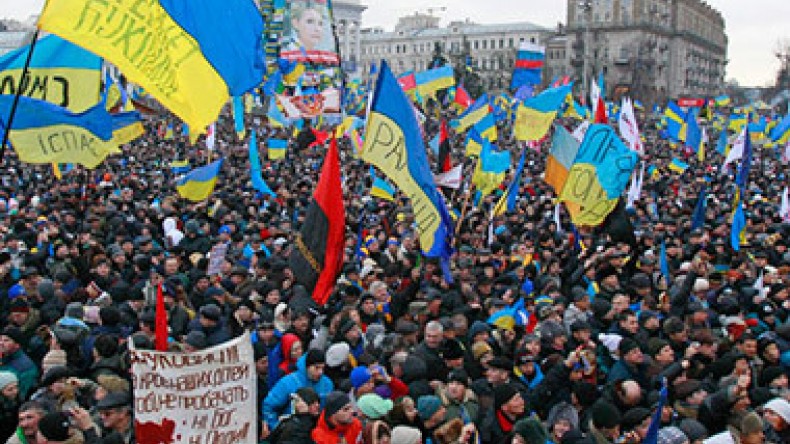
Ukraine: Which way to Europe and for Europe?
By Dr Alexander Yakovenko, RT
The Ukraine crisis served as a trigger for a broader crisis in the West-Russia relationship. Today, a year and a half after it started, what are the stakes and the bets?
Firstly, the declared objective of the EU’s Ukraine policy is to have it firmly integrated in a Greater Europe, represented by the EU. Thus, it would influence Russia’s development in the right direction. We have no problem with that, all the more so that Ukraine’s transformation is long overdue and in everybody’s interest.
But why acting secretly and unilaterally, rather than openly and multilaterally? We had always been told by the EU, that a routine Association Agreement with Ukraine was in the works. We never minded. But then, all of a sudden, it turned out that a Deep and Comprehensive FTA was going to be part of that. When we enquired, we were told that it was none of our business. Though it was obvious, and recognized later on, that such an FTA was not compatible with Ukraine’s membership in the CIS FTA.
It took a year for the Financial Times (on 7 April) to admit that “in Ukraine’s case, the ENP’s mechanical approach blinded EU policy makers in 2013.” The paper called on Brussels unaccountable bureaucracy “to avoid such mistakes.” The British House of Lords in its February report also concluded that the EU sleep-walked into the current crisis. Alfred Tennyson’s line “Someone had blundered” comes to mind. In any case, the EU made a risky foray into old geopolitics with disastrous results. Why lay the blame for one’s blunders at Russia’s door?
Secondly, the US and NATO have enough technical capabilities to know what was really happening in the Crimea. It equally applies to Eastern Ukraine. They either cannot provide evidence to support their allegations of Russia’s involvement or cannot manage their alleged truth.
We will never put up with a war by proxy on our border. When we get the response from NATO general’s mouths, rather than their guns’ muzzles, it would be laughable, had it not been for the death and destruction caused by Kiev’s Orwellian anti-terrorist operation (ATO). The New York Times was right when in its editorial (July 3, 2014) it described Kiev’s decision not to extend the June truce, but conduct the ATO, as a fateful step.
What is more, Ed Lucas, no friend of Russia, writing in The Times on 12 August 2014, was appalled by the prospect of the West “bankrolling indefinitely a failing state, run by corrupt politicians, oligarchs and paramilitary thugs.” So far, the developments in Ukraine have not proved that prediction wrong. The choice is clear: it is either war or transformative reforms. Kiev still insists on the military solution, which undermines the Minsk agreements.
Thirdly, President Barack Obama in his CNN interview with Fareed Zakaria in February did admit that the US “had brokered a deal to transition power in Ukraine,” i.e. behind the backs of the German, French and Polish Foreign Ministers who helped reach the 21 February agreement between President Viktor Yanukovich and the parliamentary opposition. The US thus endorsed the power grab which destroyed the politics of consensus and constitutional order that had held the country together for 23 years. The people in the Crimea fled the revolutionary chaos and violence of an obviously nationalistic regime.
For Russia, when the cause of Ukraine’s territorial integrity was lost in the coup, the interests of the people on the ground became a paramount concern. Is it not in line with Europe’s post-modern values, relegating a state’s sovereignty to the status of a secondary concern.
Fourthly, Russia is accused of waging an effective propaganda campaign in the West, the situation that the West and “outgunned” Brussels’ Eurocrats cannot reverse in the media space they have been controlling for ages. Maybe, the reason is they cannot manage the truth, which is the ATO and its consequences, including indiscriminate shelling of civilian infrastructure and civilian population. But, first of all, the West cannot explain why Kiev has chosen war over political settlement. And I fully agree that innovative thinking is in scarce supply in Europe.
The recipes are obvious – no prospect of NATO membership for Ukraine and federalization of a divided country (the latter option favored by Vernon Bogdanor on The FT’s pages). Henry Kissinger and Zb. Brzezinski are among those who support these outcomes.
Finally, on rules-based order and Russia’s revisionism. In this particular case the EU laid down the rules of unilateralism which we thoroughly followed. The Soviet Union was once, at the time of the Cultural Revolution, accused of revisionism. Remember that there was no formal post-Cold War settlement in Europe. Recently, the Ditchley Foundation conference came to the conclusion that “it was difficult to see how current tensions could be resolved without moves towards a new security system” in Europe.
George Friedman (of Stratfor) revealed to the Chicago Council on Global Affairs, that the Ukraine crisis represents America’s grand strategy to establish a cordon sanitaire to keep Russia and Germany apart. So far this conspiracy against Europe succeeds. Hopefully, the Europeans will wake up to the reality and will not allow their continent to be raped by divide and rule tactics.
The revisionism outcry betrays politics and policies of status quo, both internationally and domestically. Russia became a symbol of rejection and untenability of old European order and old mindset. The radically evolving regional and global context will ultimately determine the outcome of the present complex European crisis. A new mainstream is taking shape. And Russia is proud to be part of this process, to be on the side of common sense and truths universally acknowledged, that underlie it.
Newsfeed
Videos






























